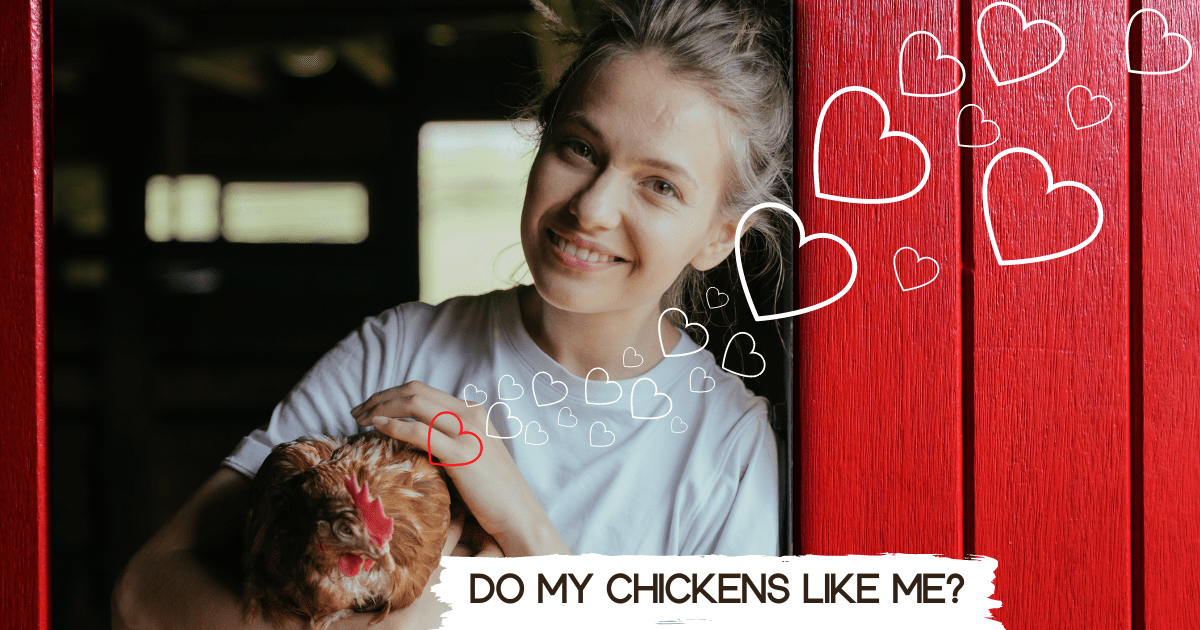Have you ever wondered: do my chickens like me? Most people don’t get chickens for affection, however many owners will agree that they share a special bond with their chickens. Just as dogs are devoted and loyal, chickens show their affection for example by following you around. They can even run to you when you call them or eat treats out of your hand. They may even sit on your hand or shoulder or become lap chickens. Do you want to know how to become friends with your chickens?
Chickens can be almost dog-like in loyalty, cuddliness, and temperament
Dogs and cats are still the most popular pets in the United States, but chickens can make wonderful pets, too. There are approximately 139,700 households with pet poultry in the States, and the number is increasing every year. Why are these feathered animals so popular as pets? Chickens are great pets because they are docile and easy to care for. They do not need much space. They can be kept in a small backyard or even an apartment. There are several benefits of having chickens – they keep the backyard clean by eating bugs, and they produce fresh eggs. They also make great companions because they don’t require a lot of attention, but will still follow you around the yard and lay on your lap when you sit down. Some of the most popular cuddly lap chicken breeds are Barbu D’Uccles, Silkie, Buff Orpington, Salmon Faverolles, Cochin, Easter Egger, Polish, and Sultan.
Chickens have feelings, they have an emotional life, and they enjoy being with humans
Chickens are capable of experiencing love, happiness, sadness, fear, and frustration. They can also get jealous when they see other chickens getting more attention than them. There is a lot of research on how chickens behave with humans. They feel safe and secure when they’re near a human and they enjoy the attention. This is not a new discovery. In fact, scientists have been studying chickens for decades to see how their behavior changes when humans are nearby.
One study found that chickens will spend more time preening themselves when there’s a human nearby than if there was no one around at all. In another study, scientists found that chickens would become stressed if you try to pick them up from under their wings or from the back of their head – but if you approach them from the front or from the side, they would relax and even offer some affectionate pecks. A study done by Dr. Emily Troscianko found that chickens have more positive feelings towards humans than they do to other chickens because people care for and raise chickens from birth onwards, which creates a bond.
Here are some of the ways chickens show their love and affection:
- A chicken will exhibit affection by scratching at your skin or rubbing its beak against your leg. Some chickens will also rub against your legs, try to get closer to you, and even lie right next to you.
- When a chicken gets close to its owner, it will start grooming. A chicken can even start grooming you. Consider that as an honor because it considers you a part of the pack.
- As a pet, a chicken’s emotions will be positive as long as it has good care. In addition to loving their owners, they’ll also feel love for their eggs. The care of a chicken can influence the health of a flock, and if you provide high-quality care, your chicken will be happy and healthy. It is wise to buy a coop that’s sturdy and safe for your feathered friends. Install an automatic chicken coop door to keep predators away at night and chickens out in the morning, even if you are still in the bed.
- Chickens are highly social and love to be petted. While some chickens are hesitant to be petted, others are more than happy to do so. They are also a great way to bond with a chicken. Not only do chickens enjoy being petted, but they also have a strong sense of empathy. During a session with a chicken, he’ll likely peck at you, peep, and purr until you give him a treat.
- Besides being very smart, chickens are also incredibly affectionate. They follow you around, and they may even bring gifts to you if they’re happy. Chickens are more sensitive and empathetic than you might think, and they can remember you better than any human.
Here are some methods to increase chicken affection:
- When you feed your chicken, make sure you use your voice to communicate with them. You can try to feed them by hand. Just leave your feed or treat-filled hand in front of them for a while so they can get used to you. If you want to show your chicken love, you must be patient and give her a reward.
- The other important step in chicken affection is to learn to pet it. When you pet a chicken, you must be slow and gentle. Don’t be aggressive and don’t make quick movements. Try petting it daily so it can get used to it. Try to reach the back of the chicken with your hand, and gently stroke it. This way, the chicken will feel safe and happy.
- Try to talk to your chickens every time you see them. The more you talk to them, the more you’ll be able to understand their language. They will respond to you by peeping back at you. Moreover, they can identify up to 100 different faces, which means that they can recognize you and your voice.
- If you have a new chicken and it’s the first time you’ve held a chicken, you can start a new relationship by talking to it and holding it close to your chest. This will help them learn to trust each other, and it will also help you develop a relationship with your chicken. This is one of the best ways to build a relationship with your chicken.
- Last but not least, set up a space where the chickens can roam freely, without being confined in one small area that causes them stress. Watch them interact and get to know them. The more time you spend with your chickens, the more they will trust you and show affection towards you.










